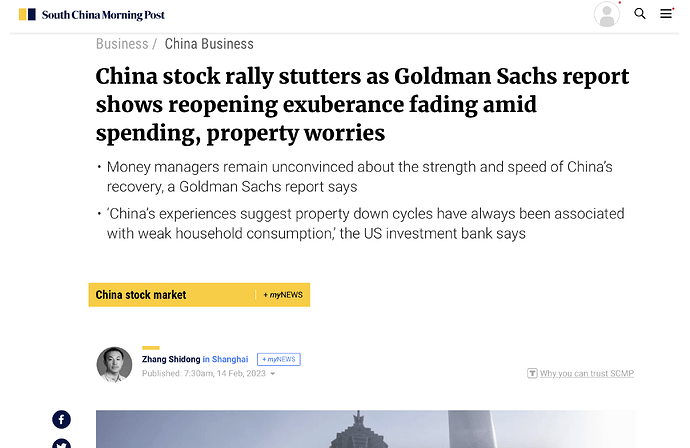- 由于消费支出低迷和房地产市场陷入困境,投资中国股票的资金经理对中国经济复苏的力度和速度持谨慎态度。
- 投资者对复苏的时间和幅度不确定,尽管大家一致认为经济将在今年反弹。
- 本地交易商预计,由于住宅市场疲软和大流行病影响,家庭消费复苏缓慢,并对房地产行业引领全行业实质性复苏的能力持怀疑态度。
- 境外投资者对消费复苏更为乐观,但对房地产市场的前景同样感到担忧。
- 高盛经济学家的报告与股票策略师形成鲜明对比,后者在截至1月份的两个月内三次上调中国股票目标。
- 由于地缘政治风险的增加,以及美联储可能对利率采取更加鹰派的立场,2月份的情绪已经转向谨慎。
- 当地投资者预计宽松政策将继续,但降低借贷成本或准备金率的可能性似乎很低。
- 交易员在3月中旬之前不会对经济有一个全面的了解,新的Covid-19爆发的可能性继续压制着股票。
- Money managers who invest in Chinese stocks are cautious about the strength and speed of China’s recovery due to sluggish consumer spending and a struggling property market.
- Investors are uncertain about the timing and magnitude of the recovery, despite consensus that the economy will bounce back this year.
- Local traders expect a slow recovery in household consumption due to the weakening home market and pandemic effects, and are skeptical about the property sector’s ability to lead a material industry-wide recovery.
- Offshore investors are more optimistic about consumption recovery, but share concerns about the property market outlook.
- Goldman Sachs economists’ report contrasts with equity strategists who upgraded their China stock targets three times in two months through January.
- Sentiment has turned cautious in February due to an increase in geopolitical risk and the possibility of a more hawkish stance on interest rates from the Federal Reserve.
- Local investors expect accommodative policies to continue, but the odds of reducing borrowing costs or the reserve requirement ratio appear low.
- Traders will not have a full picture of the economy until mid-March, and the potential for fresh Covid-19 outbreaks continues to weigh on stocks.
2 个赞
